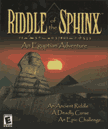Riddle of the Sphinx (ROTS)
starts out with a strong emphasis on realism. The player sees what a
visitor to the Sphinx would actually discover, down to the rusty barrels,
battered tents and port-o-potties. Here you see ancient, unyielding spaces
defaced by modern technology's attempt to pry open every secret. In one of
the tents you find a series of audio tapes filled with dictation about the
artifacts on site. These tapes are strangely relaxing to listen to -- like
watching Bob Ross paint. Later, as you find your way into the long,
cramped tunnels in the Great Pyramid the realism becomes downright
disturbing -- it's hard not to feel claustrophobic, with all those tons of
stone bearing down on you.
The game's beginning also does a good job of developing character and
getting you interested in the plot. Sir Gil's paranoia starts to feel a
little excessive. You acquire further insight when you stumble across the
notes of a former archaeological assistant. You start to wonder why Gil is
hiding clues to his discoveries in such a way that only you (or the person
who wrote your walkthrough) can understand. Is he telling you everything,
or are you being set up for some strange, ritualistic Ultimate Sacrifice?
Then, once you move to the unexplored sections of the Great Pyramid the
game does a 180-degree shift. Archaeological fantasy and speculative
wonder take over. The underground areas are magically lit by flickering
torches. You see room after room filled with fabulous Egyptian stuff --
statues, chests, harps, weapons, vases, furniture, games, toys, wall
paintings, jewelry. At this point the game loses its plot orientation, and
Riddle of the Sphinx becomes unadulterated exploration and puzzle solving.
There is LOTS to see, so the puzzles don't come too hard and fast. You do
find many, many parchments which give game hints and also hint at the
backstory; but since the parchments consist of pictures and hieroglyphs,
they don't advance the plot.
There are several remarkable locations in this game. One of my favorites
-- a huge room with marble walls every inch of which is inscribed with
hieroglyphs. The walls gleam where lit by torches. You climb a unique
staircase; and with each turn you can stop and look back to see new views
of the room revealed in shifting light and shadow.
Another favorite location -- a small room filled with items made almost
entirely of gold. Until I found this room, I was secretly upbraiding
myself for not doing the right thing in the first place: contacting the
authorities with my "find." After the gold room, the idea of contacting
any authorities seemed ludicrous. I had a strange sensation resembling
gold fever. I pelted from room to room, looking for more objects made of
gold. I chuckled when I could place them in my inventory. I complained
under my breath when the game wouldn't let me pick up the gold rings, the
gold fans, the gold figurines....
About two-thirds of the way through the game, I found myself satiated with
all this excess. I started longing for more variety in the game -- contact
with another human being, a location without those oppressive stone walls
and ceilings, even a badly-acted video message.
It was at this point that I ran into a certain puzzle that took me several
hours to solve. By the time I finally got it right, I was angry and
exasperated. This puzzle, combined with the large number of locations to
explore, plus some pixel-hunting in a few places made the game feel
really, really long -- perhaps the longest I have played.
ROTS reminds me in some ways of "Qin", with its large area of underground
exploration, its mysterious aura spiced with a tang of danger, and its
beautiful buildings and objects to admire. The puzzles are reminiscent of
certain puzzles in "Timelapse" -- many of ROTS's puzzles require you to be
good at observing patterns and interpreting symbols.
The music adds greatly to the gaming experience. Unfortunately, partway
through the game the music started to cut out briefly whenever I clicked
the mouse. This made movement with the mouse feel unusually disorienting
and jerky.
Technical issues: I had difficulties during installation. I had to delete
all former versions of Quicktime and install the version that came with
the game. This wasn't hard to do, but it was annoying. The new version of
Quicktime works for all my other games except "Obsidian", which now won't
run. Also, the game never gave me a message that it had fully installed --
after awhile the installation program just sort of stopped. I waited and
waited, and finally managed to exit. The game then told me that I hadn't
fully installed, though apparently I had, since after that the game ran
smoothly. I installed the ROTS patch before playing.
ROTS is almost entirely mouse-driven. There are two mazes. There are no
sliding tile puzzles.
Near the end of the game the pace seems to pick up (maybe it's just that
the final puzzles are a little easier?!). The ending has a couple of
interesting twists. Not everything is explained (in fact, I'm still trying
to puzzle out a full explanation for some of the things I saw).
Nevertheless, I did enjoy how the Riddle of the Sphinx is resolved.
(Side note: now that "Amerzone" has just been re-released, it might be
interesting to play "Amerzone" and ROTS in tandem, in order to enjoy the
tremendous contrast between desert and rain forest environments.)
Final
Grade : B
copyright © 2004
GameBoomers

